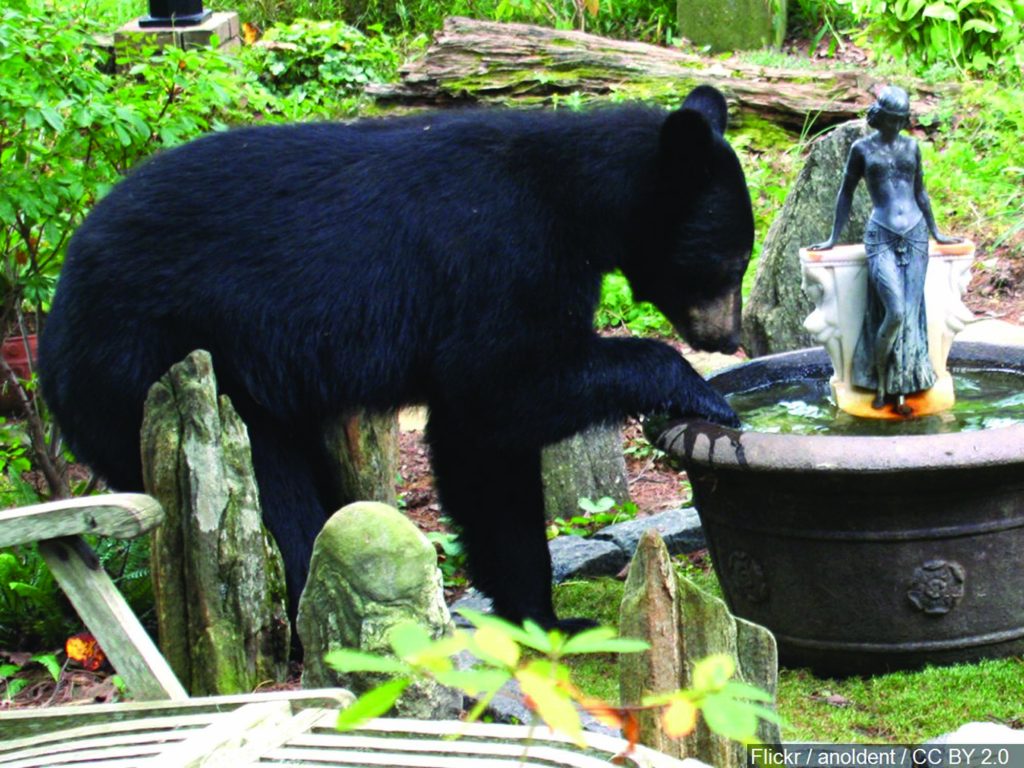ASPEN, Colo. — Colorado Parks and Wildlife officials have trapped and killed the bear involved in last Sunday’s attack on a restaurant manager in Aspen.
Officers located the bear within town limits on Monday, the day after the attack. DNA test results received late Thursday confirmed it was the same bear that bit the restaurant manager after he tried to haze the bear out of the restaurant’s dumpster. A necropsy revealed the male bear weighed approximately 400 lb, was healthy and tested negative for rabies.
“We had numerous officers and assistance from Aspen PD as we searched for the bear all day on Monday,” said Area Wildlife Manager Matt Yamashita.”We encountered two other bears in town that did not match the description. Those bears were hazed but not captured.”
Officers then received a report of a large bear matching the description of the offending bear wandering in the same area of Sunday’s attack.
“We tracked it to a second-story balcony of a business one block from where the attack occurred,” said Yamashita. “At that location, we were able to dart it, then we moved it to our office where it was euthanized.”
Officers made the field determination that they had found the target bear based on descriptions provided by the victim and bystanders the evening of the attack. Measurements of the bear’s teeth while it was immobilized matched those of the bite wounds sustained by the victim. In addition, the proximity of the bear to the location of the incident contributed to the officers’ confidence that the right bear was located.
Yamashita says because the bear was so large, had attacked a person and continued to roam in town limits, it was clearly a serious threat to people.
“A bear this size and unafraid of humans could have easily killed a person with little effort,” said Yamashita. “It’s unfortunate this bear had to die for this reason, especially when you consider it was totally preventable. Based on our experience, there was no chance this bear could be rehabilitated after it bit a person.”
Aspen and the surrounding areas have endured a busy bear year so far in 2019. In addition to three attacks on humans over the summer, calls to 911 reporting bear encounters have varied between five and 20 a day since mid-June. At least two or three of the daily calls include bears inside homes or attempting to break into homes while frightened residents hide in bedrooms and closets.
Wildlife officers say for every call, there may be up to two or three incidents that go unreported each evening.
Despite the high level of activity so far, CPW warns the bears are just getting started. In response to the approaching change of seasons, bears are entering into a state of hyperphagia, an instinctive, metabolic change resulting in an almost constant feeding frenzy as the bears prepare for winter hibernation.
“For some bears, natural foods may not be enough so they will come into human-populated areas in search of an easy meal,” said Yamashita. “If bears have easy access to food, they will keep coming back, and that puts people at significant risk.
Yamashita says CPW officers will carry out their duties to protect the public but unless residents take stronger measures to protect themselves he fears it is only a matter of time before someone is seriously injured, or killed.
“This is not sustainable,” he said. “This is in no way a normal, acceptable situation. Yes, the habitat around Aspen is perfect for bears, but that should not be an excuse to let them feed out of your dumpster, your trash can or your pantry. Consider this a warning – people need to understand how serious and dangerous this is, accept their responsibility, then take action immediately.”

CPW offers the following tips to prevent bear conflicts:
Keep Bears Out
- Close and lock all first-floor windows and doors when you leave the house and at night before you go to bed.
- Install sturdy grates or bars on windows if you must leave them open.
- Keep car doors and windows closed and locked if you park outside. Make sure there’s nothing with an odor in your vehicle, including food wrappers, candy, gum, air fresheners, trash, lotions and lip balms.
- Close and lock garage doors and windows at night and when you’re not home; garage doors should be down if you are in the house but not outside.
- Install extra-sturdy doors if you have a freezer, refrigerator, pet food, birdseed, or other attractants stored in your garage.
- Remove any tree limbs that might provide access to upper-level decks and windows.
- Replace exterior lever-style door handles with good quality round door knobs that bears can’t pull or push open.
Get Rid of Attractants
- Don’t leave trash out overnight unless it’s in an approved bear-proof enclosure or container. Be sure to research all local ordinances and regulations if vacationing.
- Clean your trash cans regularly to remove residual odors.
- Don’t store food of any kind in an unlocked garage, flimsy shed, on or under your deck.
- Don’t leave anything with an odor outside, near open windows or in your vehicle, even if you’re home. That includes scented candles, air fresheners, lip balms and lotions.
- Clean-up thoroughly after picnics in the yard or on the deck, cleaning your BBQ grills after each use. Don’t allow food odors to linger.
- Bird feeders are a major bear attractant. Only use bird feeders in winter, when bears are hibernating.
- If you have fruit trees, pick fruit before it gets too ripe. Don’t allow fruit to rot on the ground. Electric fences provide good protection for small orchards.
Teach Bears to Remain Wild
- If a bear comes close to your home, scare it away. Loud noises like a firm yell, clapping your hands, banging on pots and pans or blowing an air horn sends most bears running.
- Utilize electric fencing, unwelcome mats and scent deterrents like ammonia to teach bears that your property is not bear-friendly.
- If a bear enters your home, open doors and windows so it can leave the same way it got in. Don’t approach the bear or block escape routes.
- Never approach a bear. If a bear won’t leave, call your local CPW office or Colorado State Patrol.
- If a bear presents an immediate threat to human safety, call 911.
For more information on the best bearproofing methods for your home, visit Colorado Parks and Wildlife’s Living with Bears page or visit cpw.state.co.us/bears.
SPREAD THE NEWS
COMMENT, Like, Follow & SHARE @I70Scout
CURRENT EDITION
WEATHER & TRAFFIC PUZZLES RECENT NEWS ADVERTISE WITH US

Leave a Reply